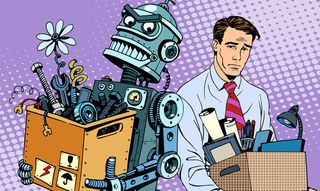AI unemployment: Is your job at risk of automation?
AIs are joining the workforce - but will they replace you or work alongside you?

AI is one of the most divisive issues of our time. Anyone with an interest in this emerging technology and it is still very much emerging seems to fall strictly into one of two categories: wildly pessimistic ("the robots will kill us all!") or wildly optimistic ("we'll live in a post-capitalist, robot-fuelled utopia!").
But before we get to killbots or a universal life of leisure, there's a more immediate concern: will AI take our jobs?
Proposition 1: AI will decimate the economy as we know it, causing mass unemployment
Notable proponents:
AI is the next logical and technical step in automation. Already, it's automating formerly manual processes in the world of tech supposedly taking the load off IT professionals. But if the majority of your job can be automated, what need does the business have for you? Even if, as is currently proposed, IT pros can retain their jobs by using the time freed up by automating repetitive tasks to "add value" to the business by working more creatively, creative AI is already in development (though it's a fair way off).
Eventually, humans or most humans will be squeezed out of the IT department.
It's not just the IT department that's at risk. Automated translation and interpreting software underpinned by machine learning, such as Skype Translator, is reducing the need for trained linguists, and could render them obsolete or at least a quaint anachronism within the next couple of years.
Chauffeurs, as well as taxi, bus and lorry drivers, are all on the hit list as well. With self-driving vehicle technology, powered by complex smart city AI, the idea of having a human-piloted car could in the future be seen in the same way as we see horse-drawn carriage.
Get the ITPro. daily newsletter
Receive our latest news, industry updates, featured resources and more. Sign up today to receive our FREE report on AI cyber crime & security - newly updated for 2024.
Intelligent robotic carers for the elderly and ill are already being developed, which would put paid to the jobs of the carers we have now. AI diagnosis, which is increasingly more accurate than that of doctors, might make medics obsolete especially as roboric surgery improves and nurses could likely be replaced by robots too. This is being pioneered by the dubious use of patients' data to inform apps like DeepMind's Streams app, which uses masses of data to detect acute kidney injury.
The idea that this will necessarily lead to mass unemployment is refuted by those on the other side of the argument, who claim that the Fourth Industrial Revolution will be much like the previous three. The Luddites and machine breakers were right new technology did take their jobs, but the industrial revolution as a whole created new jobs that were unimaginable before it got underway.
But AI is growing so fast it's incomparable to what came before. The Industrial Revolution in Europe took place over a period of nearly 100 years two or maybe three generations for those who experienced it. AI is making significant progress in multiple areas at the same time and, more importantly, it learns from its previous experiences.
University of Oxford researchers estimate 35% of UK jobs are at risk of automation over the next two decades, while the Bank of England puts the figure at 15 million at-risk jobs over the same period. Middle income jobs will be most at risk.
Mass unemployment at all levels of society beckons in this vision of our AI future, and while universal basic income has been proposed as a solution, fewer people in work means fewer tax receipts. Fewer tax receipts means less income for the state, which means there's no money for out of work benefits, universal basic income or, in fact, any other benefits.
Without sufficient advanced planning to reskill the population, which should start now, the outlook in the short-to-mid term following this unemployment tipping point is bleak.
There are many who vehemently oppose this proposition, however.
Turn the page to read our counter-argument - on AI's potential to create jobs and work alongside us

Jane McCallion is ITPro's deputy editor, specializing in cloud computing, cyber security, data centers and enterprise IT infrastructure. Before becoming Deputy Editor, she held the role of Features Editor, managing a pool of freelance and internal writers, while continuing to specialise in enterprise IT infrastructure, and business strategy.
Prior to joining ITPro, Jane was a freelance business journalist writing as both Jane McCallion and Jane Bordenave for titles such as European CEO, World Finance, and Business Excellence Magazine.




